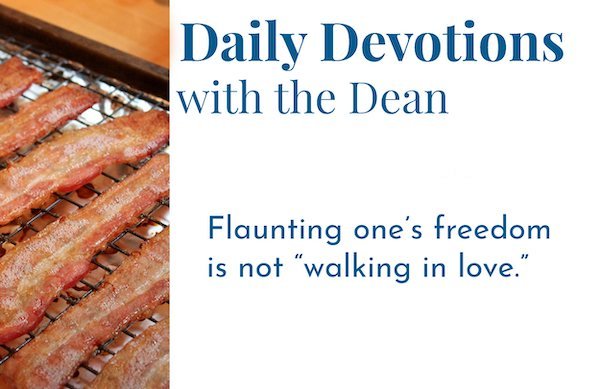Wednesday • 7/24/2024 •
Wednesday of Proper 11
This morning’s Scriptures are: Psalm 119:49-72; Joshua 8:30-35; Romans 14:13-23; Matthew 26:57-68
This morning’s Canticles are: following the OT reading, Canticle 11 (“The Third Song of Isaiah,” Isaiah 60:1-3,11a,14c,18-19, BCP, p. 87); following the Epistle reading, Canticle 16 (“The Song of Zechariah,” Luke 1:68-79, BCP, p. 92)
But Jesus was silent. — Matthew 26:63. In John’s gospel, Jesus is straightforward about his identity: “Before Abraham was I AM” (and expounded in seven “I AM” sayings). In the Synoptic gospels, Jesus’s approach is more oblique: he leaves it to others to figure out his identity and the nature of his mission—until he decides to clarify. Pressed by the high priest, Jesus finally acknowledges his identity as the “Son of Man” figure that Daniel had prophesied. The unfolding events would eventuate in his “coming” into his authority at the right hand of Power. In a word, “Yes,” Jesus is saying, “I am the Son of God” (Matthew 26:64). At that point, the Jerusalem leadership finally “got it” (but not in a good way).
With today’s reciting of the blessings and curses at Mounts Gerizim and Ebal in Joshua 8, renewing the covenant between God and his people, we are reminded of the most significant choice any human being on planet Earth has: what am I going to do with God’s claim on me? Do I track with the Bible’s account of creation, fall, and redemption—is the cosmic and global story contained in the Scriptures my own as well? If so, how do I find my way to live faithfully, truthfully, and consistently with that story?
Throughout Paul’s letter to the Romans, he has developed and delivered that very roadmap. He has shown the way Jesus—his divine person and his redemptive work—is the crown, the telos—of an elaborate and profound story line. Adam was “type of one who was to come” (Romans 5:12-21). Abraham was “father of all of us” who believe (Romans 4:16). The Passover prefigured the setting forth of an atoning sacrifice, and Moses’s leadership prefigured a Spirit-led journey from slavery to freedom (Romans 3:21-25; chapters 6-8). David gave us a preview of a royal Son who rises from weakness to power, and who sings God’s glory among the nations (Romans 1:3-4; 15:9).
I once recall a professor declaring, “If your metanarrative is stable enough, you can allow wiggle room around the periphery.” At the beginning of Romans 12, Paul looks back on this grand story, this metanarrative, and then commends a lifestyle of worship that is congruent with that story. “I appeal to you, in view of the mercies of God, to present your bodies as living sacrifices” (Romans 12:1). Thus, with Paul’s help, we have God-honoring guidance for responding to situations where there is disagreement. Part of that living sacrifice is extending to one another grace in disputable matters—not because they don’t matter, but because the whole is more important than the periphery.
In today’s reading, Paul is discussing a situation where some believers feel free to eat meat offered to idols, while others feel it is sinful to do so. Paul’s instruction is that it is wrong to flaunt one’s freedom in that matter, or to lead others to do something they think is wrong. “Do not let what you eat cause the ruin of o
ne for whom Christ died.”
There are any number of modern-day equivalents we can use to illustrate the kind of situation Paul addresses, but an example about pork might offer some insight. Some Christians believe that the Old Testament prohibitions against eating pork still apply today. Others believe those prohibitions no longer apply. If a child from a “non-pork” family was a guest in your home, it would be wrong for you to knowingly serve him, or persuade him to eat, bacon for breakfast. Before God, according to your own conscience, eating pork is not a sin, but to your brother in Christ, it is sin. “Everything is indeed clean, but it is wrong for you to make others fall by what you eat.” Leading someone, adult or child, to violate their own conscience does not make for peace or mutual upbuilding. Flaunting one’s freedom is not “walking in love.”
In today’s paragraph, Paul sketches important priorities concerning Christian liberty:
Those of us who think of ourselves as having, before God, freedom regarding some debatable, but peripheral matters, have the responsibility for reining ourselves in for the sake of brothers and sisters who would be led to violate their consciences by our examples (Romans 14:15, 23).
Negatively put: I may not “destroy” my brother or sister with my liberty (Romans 14:20). Positively put: my job is to “pursue what makes for peace and for mutual upbuilding” (Romans 14:19).
We can, with integrity, deny ourselves some liberties, without denying our identity in Christ. In fact, this is one way we take on a Christ-shaped identity (looking ahead to tomorrow’s reading): “For Christ did not please himself” (Romans 15:3).
Forcing our practices on others is not what the kingdom of God is about. The kingdom is about “righteousness and peace and joy in the Holy Spirit.”
If the central storyline of Jesus Christ’s work of redemption for sinners is intact, then it’s actually OK to allow each other some breathing room. We don’t need, nor can we demand, that there be complete agreement between us on lesser points of teaching, worship, and practice. “The faith that you have, have as your own conviction before God. Blessed are those who have no reason to condemn themselves because of what they approve.”
I pray that today you know, in all things, righteousness and peace and joy in the Holy Spirit.
Be blessed this day,
Reggie Kidd+



